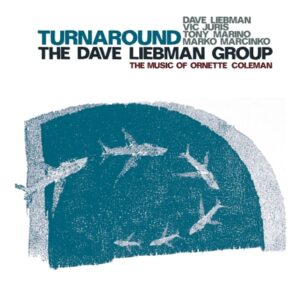CD jw 079 DAVE LIEBMAN GROUP:
TURNAROUND – THE MUSIC OF ORNETTE COLEMAN
DAVE LIEBMAN tenor & soprano saxophone, wooden flute
VIC JURIS acoustic & electric guitar
TONY MARINO acoustic bass
MARKO MARCINKO drums & percussion
Recorded January 5 & 6, 2009
DEU
Viel wurde schon geschrieben über das musikalische Erbe von Ornette Coleman, über seinen „harmelodischen“ Ansatz und seinen allgemeinen Einfluss. Allein seine frühen Aufnahmen aus den späten 1950er und frühen 1960er Jahren und aus dieser Zeit insbesondere die Doppelquartette von „Free Jazz“ reichen aus, um ihm einen Platz in der Musikgeschichte zu sichern. Wie in jeder großen Musik ist es auch hier der Geist, der am hellsten strahlt. In Ornettes Musik waltet der Geist der Freude, der alles durchdringt und dem es zu verdanken ist, dass alle seine Kunst so sehr lieben. Seine Musik ist Ausdruck einer unbändigen Lebensfreude. Erhebend und traurig, verspielt und todernst zugleich, umfasst sie das gesamte Spektrum der menschlichen Existenz. In tiefem Respekt vor einem wahren Individualisten und Meister seines Metiers hoffe ich, dass Ihnen unsere Ornette-Coleman-Reise gefällt. Dave Liebman
ENG
The „raison d’etre“ for this record was to apply harmonic structure to the compositions of Ornette Coleman, the musician who first liberated jazz from it’s dependancy on the same. In principle, this seems an almost preverse approach but Dave Liebman is a musician who has the creative nous to employ harmony in a fashion to ensure that the music always fascinates and sounds fresh. Liebman’s comments within the liner notes in relation to this approach make interesting reading. All the compositions, bar the closing „The Sky“, come from the pen of Ornette. The child-like joy of his tunes remains and the programme takes in the usual jaunty themes like „Enfant“ and „Bird food“ as well as ballads such as „Kathelin Gray“ and „Lonely Woman“, the later re-worked with some lush sustained harmonies from Vic Juris‘ guitar synth backing the wooden flute. Sometimes the approach tends to strip away the radical nature of Ornette’s original ideas but the re-working of something like „Turnaround“ pushes the music in a tougher, more muscular area, the music having an almost funky feel at one point. This disc has plenty of the leader’s big sounding tenor to compliment his laser-accurate soprano work. Of all the tracks, „Cross breeding“ is most in the spirit of Ornette and the scurrying and inter-weaving lines of the soprano and guitar make this the stand out track – so good that the replay button is hit every time I play it. Although dedicated to the compositions of Ornette Coleman, what I like about this record is the variety of approaches, a bit of acoutic guitar here, some latin jazz there and elements of be-bop elsewhere. This makes for a very rounded record that might appeal to those fans who may not have been won over by OC as well as those who are switched on to the current jazz scene. In summary, the approach taken by Liebman may be more orthodox and place the music pretty much inside the contemporary mainstream but the whole record is chock-a-block with inspired, intelligent and brilliant playing. Liebman and the criminally neglected Juris may take the honours whilst Tony Marion and Marko Marcinko are extremely effective. Sometimes the music is not too disimilar to Ornette’s 1980’s enncounter with Pat Metheny whereas other elements sometimes hark back to the spirit of jazz before Coleman’s innovations. The closing track, an Liebman original, has the most abrasive sax playing on the CD, the music sounding more like Albert Ayler with it’s multi-phonics than anything else before the snakey theme emerges. Not only one of the best CD’s of 2010, but one of the most intriguing. Incredible that it seemed to have snuck under the radar. Recommended. Ian Thumwood

